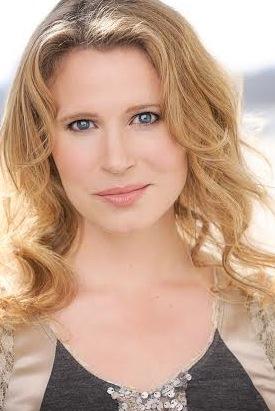Interrogating Jessica Dickey of ‘The Guard’ at Ford’s
By • October 22, 2015 0 915

During the course of the opening night performance of “The Guard,” (part of the ongoing Women’s Voices Theater Festival in the Washington area), the usual pre-performance formalities are always engaged in—thanks to benefactors, donors and supporter, and, in this case, a shout-out to the playwright, if they happen to be in house.
From a distance, you could see a blondish woman rise out of her chair and take a modest head bow for the ensuing applause.
“For me that was quite a moment,” said Jessica Dickey, the playwright in question. “I had my loved ones there, my family and my partner. It was special, I have to say. It was special having my play performed here in Ford’s Theater. That was a little different, to say the least. And it was that moment, too, when you sort of let go of your creation, it’s completely belongs to others now, the people on the stage, who inhabit the characters, and everyone else.”
Ford’s Artistic Director Paul Tetreault, one of the founders directors behind the women’s theater festival, knew of Dickey’s previous work and commissioned her to write a play for the festival. The result was something a little different but from but also in the tradition of the theater in the sense that weighty matters were being discussed, disguised as drama, and in the most accessible and sometimes even profane ways.
She laughed when we talked on the phone about some of the language in the play, which is an exploration of art in the life of human beings of all sorts, primarily, but not excluding, a museum guard who could be working at any of our city museums. Somehow, in the course of things, people grieve over loss, guard the premises, talk about the art on the wall—Rembrandt—and see how, in the presence of art, life becomes richer even with the impending death of a loved one. In the course of things, Rembrandt himself, as well as Homer, the subject of a painting, take the stage both vividly, and quite colloquially.
We asked Dickey about her approach to such weighty matters—it’s in the DNA of her previous plays, which includes a haunting, well received work on the massacre of Amish children, and Confederate re-enactors of the Battle of Gettysburg. She’s also currently working on a play about Galileo’s daughter.
“Well, I hadn’t quite thought of things as weighty per se,” she said. “I think art deals with things we confront and encounter and inspire us to think about life. And I am a writer, and an artist, as well as an actress. So, this is how I express myself.”
She expresses herself extremely well in the theater, and over the phone. As on stage, so in person by way of conversation, she is funny, and smart, with popular references and language (the word “dude” comes up) mixing in with sharp, referenced observations. One thing that’s probably worth knowing about her is that even on the phone she sports a spirited, full-throated laugh, which probably means that she’s a person worth telling a joke or funny story.
“The Guard” came out of a visit to the National Gallery of London, and observing a guard there. Out of this came much—the play is a full-bodied contribution to not only the festival but the theatrical canon.
“You know, what we do is so intimate,” she said. “I like to be involved in the process, not in terms of interference, but how it works—plays these days undergo a lot of versions, readings, workshops and finally the rehearsals, and the closer it gets to the finished play and its production, the further removed you become. I was offered to attend a meeting of the board here—maybe it was just routine—and I accepted, and it was exciting and informative.
She is not, as she will be the first to admit, shy. “I was a bit of an athlete when I was in school, I played boys basketball when I was little, and I’m in the theater and an actress. We’re in the business of story-telling—look at what’s happening in television, these continuing stories.”
“In this play, I was interested in the things that last in memory and time,” she said. “As a writer, you wonder if your work will last, will be around long after you’re around. The stage itself, acting, that disappears the moment it’s done which is ephemeral.”
“As far as the festival goes, to me, it’s a remarkable thing,” she said. “I mean that it’s being done at all, and on such a scale where a whole theatrical community is basically committing to this at the beginning of a season, all premieres, at all levels. I’m incredible glad to be a part of it. It’s been quite an experience.”
In many ways, her work—and Jessica Dickey herself, are quite an experience.

